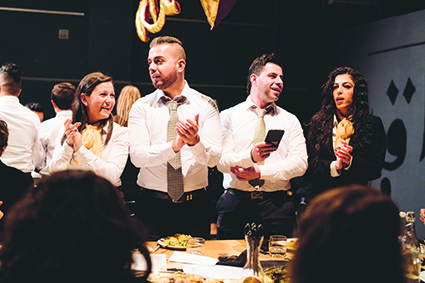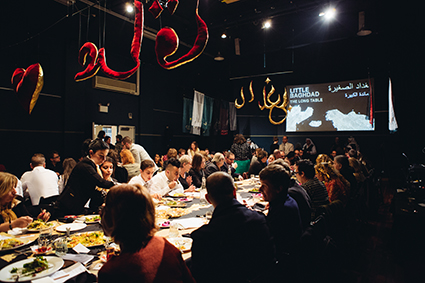Conversation, celebration, compassion
Keith Gallasch: Powerhouse Youth Theatre, Little Baghdad

Choir of Love, Little Baghdad
photo courtesy Powerhouse Youth Theatre
Choir of Love, Little Baghdad
The first of three of Powerhouse Youth Theatre’s The Long Table gatherings was a gloriously celebratory cultural event. Titled Resilience and Rituals, it gathered together immigrant groups from across Iraq, each with their own distinctive culture—language, music, dress, cuisine—and exacting stories of loss and survival. This made for a uniquely cross-cultural event framed by the meeting of Iraquis with fellow Australians over a wonderful traditional meal.
The Long Table combined the sharing of food with live music, talks, films, poetry, song and conversation. Discussions bounced around the two tables in the crowded room or took place face to face between new acquaintances. Young poet Reewan Al-Mari, bringing together Arabic and English poetry and rap, declared himself “comfortable in both worlds, East and West.” From time to time, sitting among us, the stylish young Choir of Love (led by Bashar Hanna on keyboards with a very fine oud player) stood to sing with considerable verve traditional and other songs with the audience sometimes joining in.
A sense of generational heritage pervaded the evening. With her daughter translating, Suham Al-Sabti described her teenage desire to be an actress, only to be thwarted by her brother who broke the high heels off all her shoes and made her promise not to act until she’d finished her studies in three years’ time—which she did until becoming one of Iraq’s most famous actresses, frequently playing the ‘mother’ role. Her daughter, Yassmen Yahya, now president of an Iraqi religious minority association in Australia and a worker for STARRTS (NSW Service for the Treatment and Rehabilitation of Torture and Trauma Survivors), spoke with pride of her life in Australia but also of lives ruined by war in the Iraq she left behind as bombs fell every 10 minutes. Her own daughter, Sarah Yahya, spoke in turn of her grandmother’s life in Iraq’s golden age and the loss of careers for a generation of progressive women like her mother. She herself spoke ambitiously of a career in international journalism, observing that people still quiz her freedom to travel as a young woman.
Potent coffee and sweet tea were served by cheery middle-aged men in traditional costumes from a variety of regions. Food was provided by The Parents’ Café, a remarkable, small but highly effective organisation that assists newcomers to adjust to Australia with aged care advice, workshops, excursions and even lawn-mowing for men.
We watched a film by Iraqi-Australian Zahra Alsamawi, shot from within a car in Baghdad at night, passing from checkpoint to checkpoint, the places most vulnerable to bombings. As violence diminishes in the city, forgetfulness can creep in. Nonetheless she feels anxious. Later in the evening she speaks to us via Skype from Iraq (during Ramadan, in 50-degree heat, the streets empty) where she is spending time with other independent filmmakers.
Activist artist Zanny Begg leads us all in a drawing exercise in which, in threes, we create a hybrid beast, folding paper so we can’t see what the others have drawn save for the points at which the body points must join. The creature is meant to be inspired by a mythical legless “bird of compassion,’ the Homa, which, like refugees, is always in flight. Begg disappears with the results, returning later to project them as magical 3-D-ish figures, witty and weird. The format relates to drawing program, Undrawing Borders, the artist and collaborators have conducted in the area including in detention centres.

Little Baghdad
photo courtesy Powerhouse Youth Theatre
Little Baghdad
Hanging above the elegantly laid tables were beautiful letters made of organza and gold applique spelling out “Baghdad” in Arabic. These were made by a local sewing group, dressed in accompanying joyously bright colours, from The Parents’ Café. Each woman was responsible for the making of a letter true to her own handwriting, as we saw demonstrated on projections. In their midst sat a sombre woman in black, their leader, whose tale we now heard. In 2012, a terror bombing in a church killed her husband, son and relatives. With her three daughters she came to Australia, to a new life: “We have hope.”
Many stories are told on this night. I ask a man next to me the meaning of a song. He explains that he’s an Assyrian speaker with no Arabic. He tells me of his four-year journey as a boy to become an Iraqi-Australian.
It would be wonderful if more Australians could enjoy this kind of informally hosted, adroitly programmed coming together, this sharing of stories both sad and positive that raise cultural awareness and build empathy. Thank you, Powerhouse Youth Theatre.
Powerhouse Youth Theatre, The Long Table, Little Baghdad, The Choir of Love, Fairfield Arts Centre, 25 June
RealTime issue #128 Aug-Sept 2015 pg. 31






